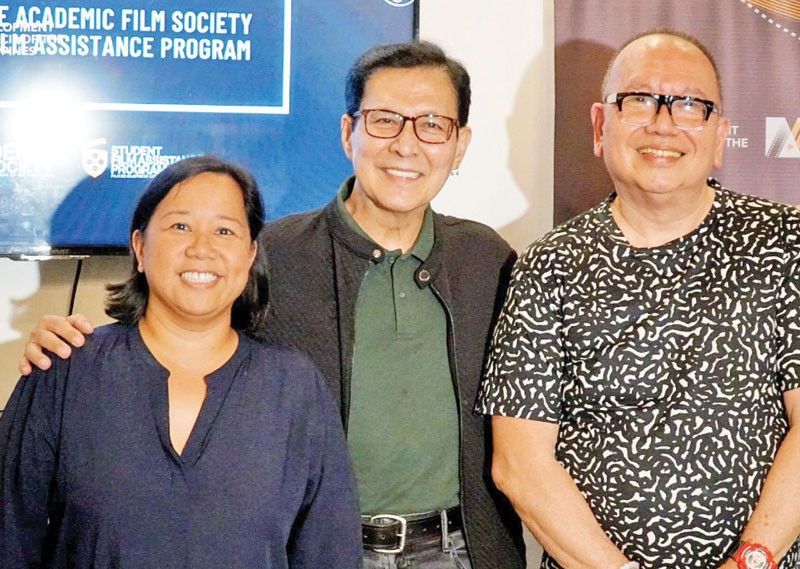FDCP launches projects for film students, starts annual awards for artists

MANILA, Philippines — Seven months into his term as chairman and CEO of the Film Development Council of the Philippines (FDCP), Tirso Cruz III has not slowed down in initiating projects and implementing them.
“From the start, the target of our administration is three-pronged,” Tirso informed. “Support for the local films, not just in Metro Manila, but also regional. Support to the students who are taking up direction, scriptwriting, cinematography. We are looking at the future of the industry. Archiving is also part of FDCP’s target because films have to be taken cared of. At present, we have 42,000 materials in our archives — old films, betacam, tapes, TV. The division is trying to work on salvaging the materials. We have an airconditioned area for 24/7.”
“There is also the process of transferring films into digital. Just the restoration process alone, that’s expensive,” Tirso disclosed. “We even sent films of (Lino) Brocka abroad. That really costs money. We cannot touch a film for restoration unless we were given the right.”
Tirso described the past seven months for him as a “learning curve,” being the chairman and CEO of the FDCP. “I’ve been learning a lot of different things,” he said. “There are still a lot to learn. It’s not easy. You talk to a lot of people.”
He announced FDCP’s new programs to revitalize and sustain the local film industry. “The growth and development of the film industry is one of our foremost goals,” Tirso said. “With the programs that we are excited to share with you, with your invaluable help, we will be able to set the foundation to contribute to the fulfillment of this mbission.”
Director Joey Reyes was invited as a technical consultant after Tirso came in to FDCP. “Pip dragged me into this job,” Joey smilingly admitted. “He called me up at 8 a.m. on a Sunday to invite me to help him. I still had not taken my morning coffee nor my daily walk at that time.”
An FDCP Board of Trustees representative for the academe, Joey, who is a professor at College of Saint Benilde, lamented how a number of film students, by the time they are graduating, had to look for funds to complete their thesis.
“Even the above-average students are finding it hard to do their thesis,” Joey said. “We are doing these for the students because they are the next generation of filmmakers. Their thesis films become their calling cards to the industry. It’s best to help them at that level.”
“And while we’re doing that, we are already doing a thesis segue from the academic world to the professional world. Finishing school is just the first step for them. The bigger move is when they do their capstone projects, they will have a calling card to the industry. So, imagine when you give them greater opportunities,” he added.
Joey wanted the students to realize that Filipino films are not for Manila alone. They are for the 7,000 other islands. That’s why FDCP is doing the contest nationwide.
They will screen the best proposals submitted by the students, with the help of FDCP’s seed money, so the students can do their thesis films. There will be a total of 50 grants annually, 25 to be given every semester. Even regional entries will be welcomed.
“The students from the regions are the ones who need budget and financial assistance,” Tirso said. “Not only Metro Manila but also regional.”
There will be free workshops — scriptwriting, cinematography and acting (using the Meisner method, to be facilitated by actress Angeli Bayani) — open to students and amateurs who want to get into it.
“The ones open to guild members are the intermediate level workshops for practicing professionals,” Joey said. “Then, there are also the master classes. We are distributing the workshops. There are even classes to be conducted in Davao.”
“Our batch was fortunate at that time because there were only a few of us. We went through half an eye of a needle to accomplish what we had to do and get to where we are now. Our careers are stable. The careers of young directors today have a very fast expiration date,” he shared.
“The batch today are fortunate, although they are not too lucky. It’s so easy to be a film director now. You have your phone camera and your laptop, you can come up with a film and call yourself a director. Everything is made easier for them.”
There are more opportunities now for young filmmakers. Since July last year, FDCP has been sending film students to Busan (South Korea), Berlin (Germany) and Cannes (France), according to Rica Arevalo, division manager, FDCP Development Support Division.
“We provide free airfare and shoulder their fees to attend film labs in Asia, Europe and the US,” Rica said. “There are more opportunities for them to learn what’s happening in filmmaking in other countries.”
The AFS (Academic Film Society) will comprise a selection committee of academics and professionals. Every semester, the FDCP will open 25 slots to Filipino student filmmakers enrolled in AFS-registered academic institutions.
“Even if you’re an engineer and you love films, you can join the contest,” Joey informed. “As long as you are part of the school that is accredited, you can apply.”
Successful applicants may receive a range of P30,000 to as much as P50,000 worth of cash grants to help them produce their thesis films and capstone projects.
“The industry needs more of these emerging voices that will tell stories from fresh eyes, from the perspective of a new generation,” Tirso said. “Either aspiring or emerging filmmakers, these new talents can become the new leaders of the film industry.”
This year, FDCP will also start the annual awards for artists who really made a mark and did outstanding work in the industry. The 10-member Board of Trustees selected the awardees.
On the list are Dolly de Leon, who earned acting awards for her role in Ruben Ostlund’s Triangle of Sadness; Soliman Cruz, the leading man in director Mihai Mincan’s Romanian film, To the North, shown at the Venice Film Festival; and Martika Ramirez Escobar for her much-acclaimed directorial debut, Leonor Will Never Die, which screened at the Sundance Film Festival.
Lifetime awardees are Cinemalaya for starting the independent film festival nearly two decades ago, producer Lily Monteverde, filmmaker Nick de Ocampo and Star for All Seasons Vilma Santos.
To make the public return to the cinema, FDCP also purchased classic Filipino films, Cannes and Berlin award-winning films and will screen them every weekend in one theater for Sine Singkwenta or for the price of only P50.
- Latest
- Trending





























